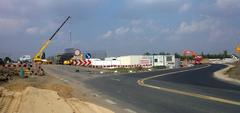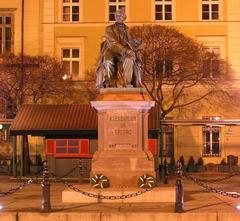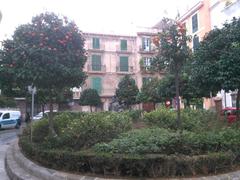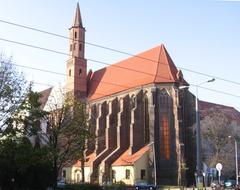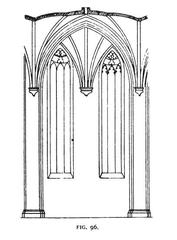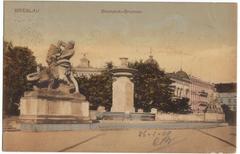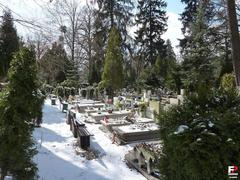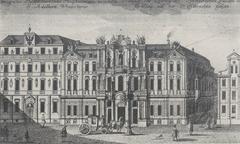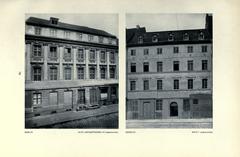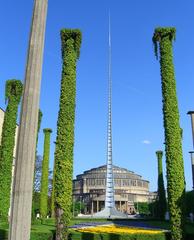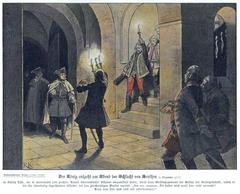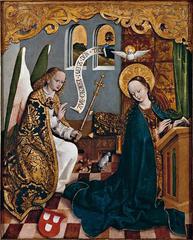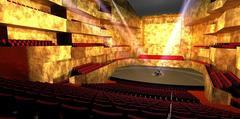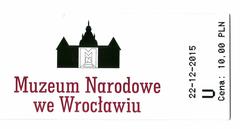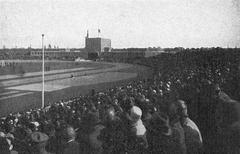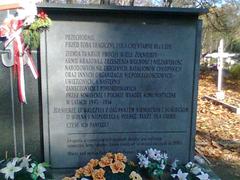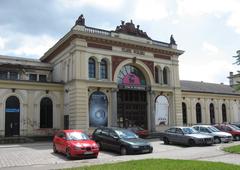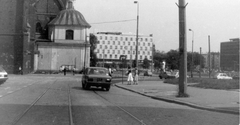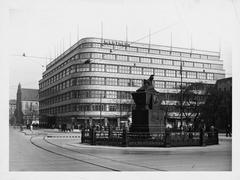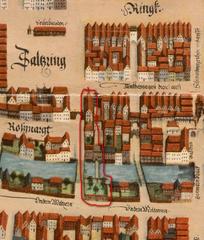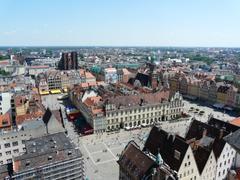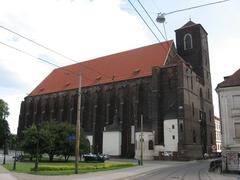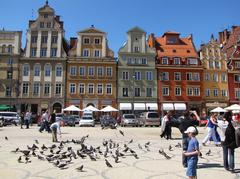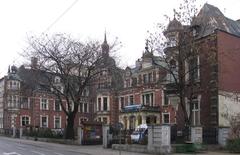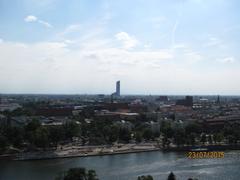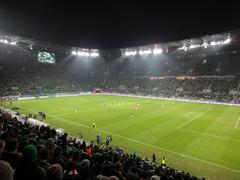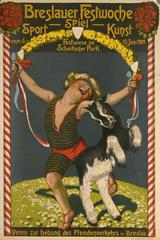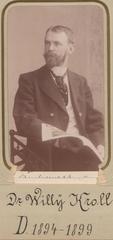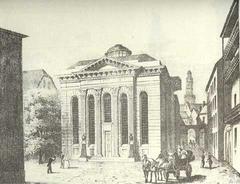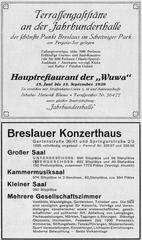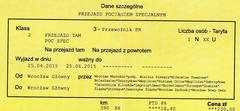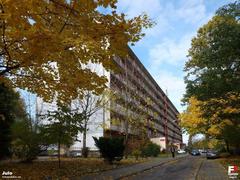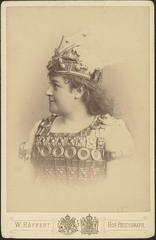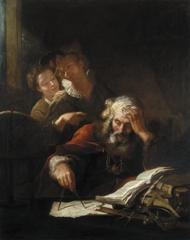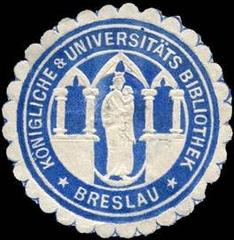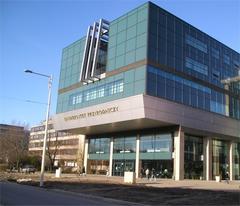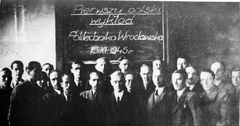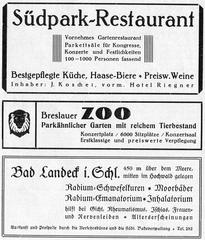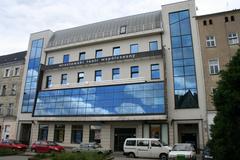Betsaal Visiting Hours, Tickets, and Historical Sites Guide in Wrocław, Poland
Date: 04/07/2025
Introduction
Nestled within the historic cityscape of Wrocław, Poland, the Betsaal of the Israeli Hospital stands as a poignant reminder of the city’s Jewish heritage, community resilience, and architectural ingenuity. This sacred prayer hall, once integral to a hospital serving the Jewish community, blends spiritual sanctuary with the legacy of compassionate medical care. Established in the late 19th or early 20th century, the Betsaal and the Israeli Hospital were at the forefront of integrating religious observance—such as Sabbath and kosher practices—into healthcare, a rarity in Europe at the time. Despite the tragic destruction of World War II and the Holocaust, which devastated Wrocław’s Jewish population, the Betsaal endures today as a preserved historical monument and educational site. This guide details the Betsaal’s history, architectural features, visiting hours, ticketing, and nearby sites, offering practical advice for a respectful and enriching visit.
For up-to-date information, refer to official local tourism platforms and Jewish heritage organizations (Jewish Heritage Wrocław, Wroclaw Tourist Info, Jewish Medical Ethics Source).
Table of Contents
- Historical Context of the Betsaal and the Israeli Hospital
- Architectural and Artistic Features
- Spiritual and Cultural Significance
- Visiting Betsaal: Hours, Tickets, and Tours
- Preservation and Community Engagement
- Nearby Jewish Heritage Sites
- Frequently Asked Questions (FAQ)
- Conclusion and Practical Tips
- References
Historical Context of the Betsaal and the Israeli Hospital
The Jewish community in Wrocław (formerly Breslau) has roots stretching back to the 12th century. By the 19th century, after the Edict of Emancipation, it flourished with synagogues, schools, and cultural organizations. The Israeli Hospital was established to meet the unique needs of the Jewish population, integrating religious requirements into patient care. The Betsaal, or prayer hall, within the hospital symbolized the importance of holistic healing—addressing both the body and the spirit. During the Nazi occupation and WWII, this institution suffered greatly; the hospital was damaged and repurposed, and much of the community was lost. In the post-war era, preservation efforts have restored the Betsaal as a testament to resilience and remembrance (Aurora Israel – History of the Jews of Wrocław, Chidusz – Jewish Community in Wrocław).
Architectural and Artistic Features
The Betsaal exhibits historicist architectural styles, merging Neo-Romanesque and Neo-Moorish elements. Its modest yet distinguished exterior features decorative brickwork, arched windows, and subtle Jewish symbols such as the Star of David or Hebrew inscriptions. The interior is designed for communal worship, oriented towards Jerusalem, with a centrally placed bimah (Torah reading platform), an elaborately carved Aron Kodesh (ark), stained glass windows, and a Ner Tamid (eternal light). Artistic motifs—menorahs, pomegranates, vine leaves—echo the Jewish tradition of intertwining symbolism, faith, and healing. Donor plaques and memorial tablets root the Betsaal in the local social fabric. Careful restoration has preserved these features, allowing visitors to appreciate the craftsmanship and spiritual ambiance (jguideeurope.org – Jewish Heritage in Wrocław).
Spiritual and Cultural Significance
Beyond architecture, the Betsaal served as a focal point for spiritual support, daily prayers, and holiday observances for patients, staff, and families. Jewish tradition emphasizes prayer and communal support during illness, and the Betsaal enabled the fulfillment of these religious obligations within the hospital. Today, it continues to serve as a site of remembrance and intercultural dialogue, fostering understanding and respect for Wrocław’s multicultural past (Jewish Medical Ethics Source, Wroclaw Jewish Sites).
Visiting Betsaal: Hours, Tickets, and Tours
Location and Access
Betsaal is centrally located within Wrocław, near the Old Town and adjacent to other Jewish heritage sites such as the White Stork Synagogue. It is accessible by public transport (trams/buses), taxi, or on foot. The Jakdojade app offers up-to-date public transit schedules (Adventures with Luda – Poland Travel Tips). Nearby parking is limited; consider park-and-ride options.
Visiting Hours
As of July 2025, Betsaal is open to visitors primarily through guided tours. Tours are generally available Monday to Friday, 10:00–16:00, with limited availability on Sundays and Jewish holidays. Hours may change due to special events or restoration; always verify through local tourism or the Jewish Cultural Center (Holidify – Wroclaw Travel Guide).
Tickets and Entry
Admission is typically through advance-booked guided tours, with fees ranging from 20 to 40 PLN. Discounts are available for students and seniors. Individual visits are not allowed to protect the site. Book tours through local Jewish heritage organizations, the Wrocław tourist information center, or authorized tour operators.
Guided Tours
Tours last about 45–60 minutes, led by local historians or Jewish community members. They provide historical context, explain architectural features, and describe the Betsaal’s role during WWII. Some tours can be tailored for schools or researchers and may include access to adjacent hospital buildings or memorial gardens (Visit Wroclaw Guided Tours).
Visitor Etiquette
- Dress modestly—cover shoulders and knees.
- Men may be asked to wear a kippah, provided at the entrance.
- Maintain a respectful demeanor; silence or soft speech is appreciated.
- Photography is generally permitted; flash and tripods may be restricted.
- Always follow the guide’s instructions and respect ongoing services or commemorative events.
Accessibility
The Betsaal offers partial accessibility, with a ramp at the entrance and ground-floor access. Some historic areas may have uneven floors. Accessible restrooms are available at the adjacent visitor center. Contact ahead for specific arrangements (Bright Nomad – Wroclaw Travel Tips).
Preservation and Community Engagement
Preserved through the combined efforts of Jewish organizations, heritage foundations, and the city, the Betsaal serves not only as a museum piece but as a venue for interfaith dialogue, educational programs, and community events. Restoration projects have focused on conserving original materials, reconstructing lost features, and commemorating Wrocław’s Jewish legacy. Ongoing engagement ensures the Betsaal remains a living memorial and educational resource (Jewish Heritage Preservation).
Nearby Jewish Heritage Sites
Enhance your visit by exploring these nearby sites:
- White Stork Synagogue: Restored post-WWII, now a vibrant center for worship and culture.
- Old Jewish Cemetery: Featuring historical tombstones, reflecting centuries of Jewish life.
- Jewish Quarter: Once the heart of Wrocław’s Jewish community, with cafes and memorials.
- Jewish Museum: Exhibits on Jewish history and culture.
- Market Square & Cathedral Island: Showcasing the city’s diverse architectural and cultural heritage (Holidify – Wroclaw Travel Guide).
Frequently Asked Questions (FAQ)
Q: Can I visit Betsaal without a guided tour?
A: No, visits are only allowed as part of organized guided tours to protect the site.
Q: How do I book a Betsaal tour?
A: Book through local Jewish heritage organizations, the Wrocław tourist information center, or online.
Q: Are there discounts for tickets?
A: Yes, students and seniors often receive discounts.
Q: Is the Betsaal fully accessible?
A: The main prayer hall is accessible, though some historic areas may not be.
Q: What should I wear?
A: Modest attire is required; kippahs for men are provided.
Q: Are guided tours available in English?
A: Yes, most tours are offered in English and Polish.
Q: Can I take photographs?
A: Yes, outside of religious services and with some restrictions.
Conclusion and Practical Tips
Visiting the Betsaal in Wrocław is an opportunity to honor Jewish heritage, reflect on history, and appreciate the intersection of faith and healing. By joining guided tours, respecting site protocols, and exploring nearby sites, you’ll gain a comprehensive understanding of Wrocław’s multicultural legacy. For the latest updates, use tourism apps like Jakdojade, consult official websites, and consider downloading the Audiala app for guided audio tours and further resources.
Key tips:
- Book tours in advance.
- Dress appropriately.
- Bring cash for small fees or donations.
- Visit the tourist information center for maps and schedules.
- Be respectful and reflective during your visit.
References
- Aurora Israel – History of the Jews of Wrocław
- Chidusz – Jewish Community in Wrocław
- Jewish Medical Ethics Source, 2019
- Jewish Heritage Wrocław
- Wroclaw Jewish Sites
- Wroclaw Tourist Info
- Wroclaw Guide
- Visit Wroclaw Guided Tours
- Bright Nomad – Wroclaw Travel Tips
- Holidify – Wroclaw Travel Guide
- Adventures with Luda – Poland Travel Tips
- Feather and the Wind – Poland Travel Blog
- Verywell Health – Hospital Visit Guidelines
- jguideeurope.org – Jewish Heritage in Wrocław
